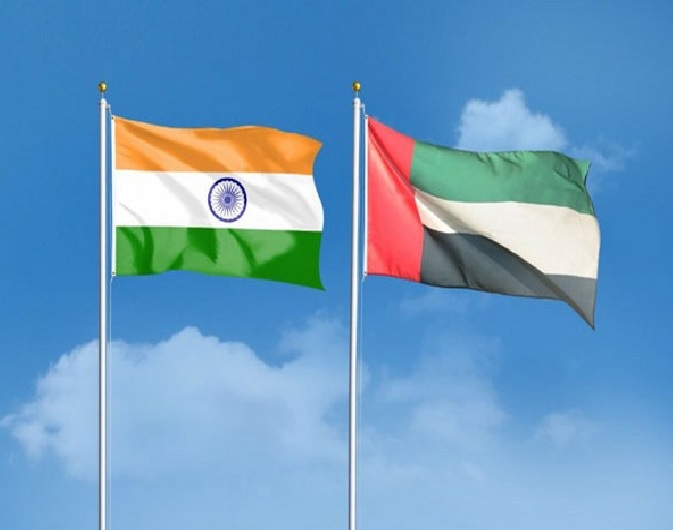The recently concluded Sharjah Investment Forum (SIF 2024) has once again underscored the rapidly evolving economic relationship between India and the United Arab Emirates (UAE). This edition, themed “A Futuristic Vision for Smart Economies,” attracted significant participation from Indian business leaders and policymakers, highlighting the growing interdependence between these two major economies.
In this context, it is important to explore the latest developments in India-UAE relations, which are not just limited to trade and investment; this partnership is expanding into new, strategic areas such as civil nuclear cooperation, energy security, and food infrastructure.
One of the most noteworthy developments in recent times is the Memorandum of Understanding signed for civil nuclear cooperation between the Nuclear Power Corporation of India Limited (NPCIL) and the Emirates Nuclear Energy Company (ENEC)-led Barakah Nuclear Power Plant.
This historic agreement was signed during the visit of Sheikh Khalid bin Mohamed bin Zayed Al Nahyan, the Crown Prince of Abu Dhabi, to India. It marks a significant step in the broader strategic partnership between the two countries as they collaborate on peaceful nuclear energy initiatives.
Civil nuclear cooperation is a new dimension of the India-UAE relationship, adding to the growing list of sectors in which both nations are keen to work closely.
This MoU reflects India’s rising stature in the nuclear energy domain and the UAE’s commitment to diversifying its energy mix by incorporating nuclear power into its portfolio. For India, this agreement signifies an important collaboration in a field that is essential for the country’s growing energy needs.
The civil nuclear deal was accompanied by other strategic agreements, particularly in the energy sector. One such agreement was the long-term Liquefied Natural Gas (LNG) supply MoU signed between Abu Dhabi National Oil Company (ADNOC) and Indian Oil Corporation (IOCL).
Energy security has always been a central pillar of India-UAE relations, with the UAE serving as one of India’s most reliable suppliers of crude oil and gas. This new LNG supply deal further cements the UAE’s role in ensuring India’s energy security, especially as India seeks to diversify its energy mix with a focus on cleaner sources like natural gas.
Beyond energy and nuclear power, the food security agenda remains a focal point of collaboration. The MoU signed between the Government of Gujarat and the Abu Dhabi Developmental Holding Company PJSC (ADQ) on food park development is an important extension of the India-UAE food corridor initiative.
This MoU is particularly significant as it links directly to the I2U2 grouping—comprising India, Israel, the UAE, and the United States—which has prioritized food security through the development of food parks in Gujarat and Madhya Pradesh.
These parks aim to enhance food production and supply chains, benefiting not just India but also addressing food security concerns in the Middle East.
The creation of food parks will focus on advanced agricultural techniques, food processing, cold storage, and logistics, which are essential to increasing agricultural productivity and reducing post-harvest losses.
The UAE’s involvement in these projects is strategic, as it seeks to diversify its sources of food imports and secure long-term food supplies, while India gains access to investments that modernize its agricultural sector and boost export capabilities.
Returning to the Sharjah Investment Forum, discussions on the Comprehensive Economic Partnership Agreement (CEPA) between India and the UAE were another highlight.
Since coming into force in 2022, CEPA has served as a catalyst for expanding bilateral trade, which reached $31.6 billion in exports from India to the UAE in FY23.
This agreement has simplified market access and is particularly beneficial for Indian small and medium-sized enterprises looking to establish a foothold in the UAE and GCC markets. The forum showcased the potential for even more growth, especially with over 3,000 Indian businesses already operating in Sharjah alone.
As Sharjah continues to attract Indian investments, bolstered by innovative initiatives like the world’s first AI-generated trade license—issued in just three minutes—the momentum in India-UAE economic cooperation is undeniable.
This technological advancement is emblematic of the UAE’s drive to be at the cutting edge of economic facilitation, positioning itself as a hub for foreign investments.
The Sharjah Free Zones, including the Hamriyah Free Zone and Sharjah International Airport Free Zone, are expected to see further growth as more Indian companies look to take advantage of these business-friendly reforms.
The India-UAE partnership is now multifaceted, encompassing not only traditional sectors like trade and energy but also cutting-edge areas like nuclear energy, food security, and technology.
As both nations continue to deepen their cooperation through forums like SIF and strategic agreements like CEPA, their relationship stands as a model for successful bilateral ties in an increasingly interconnected world.
-Vinod Kumar (Dubai)




















